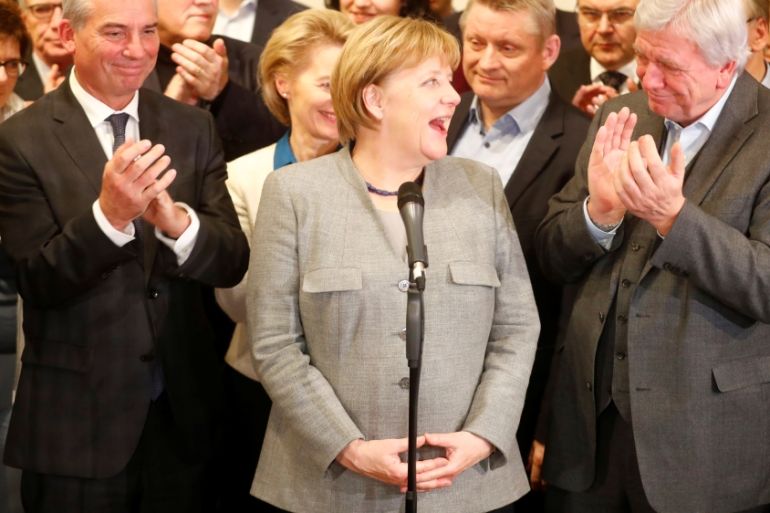German coalition talks fail after FDP walks out
Chancellor Merkel announces the failure of talks, as the EU’s largest economy gets closer to a possible new election.

German Chancellor Angela Merkel has announced that her efforts to form a three-way coalition failed after liberal Free Democratic Party (FDP) withdrew from the talks.
“Now we have to deal with the facts. And the fact is that we were unable to finish the coalition talks with success,” Merkel said in a press conference on Monday.
Keep reading
list of 4 items‘Nothing to apologise for’: Merkel defends Russia legacy
The mixed legacy of Angela Merkel
What is next for Germany after Angela Merkel?
“It is a day of deep reflection on how to go forward in Germany. As chancellor, I will do everything to ensure that this country is well managed in the difficult weeks to come.”
Merkel’s centre-right Christian democratic political alliance (CDU/CSU) secured 33 percent of the general election that took place in September, losing about nine percent of the votes compared with the last election in 2013 and failing to form a single-party government.
The chancellor was holding talks with the FDP, which secured 10.7 percent of the votes in September, and the Greens, which scored 8.4 percent in the vote, to form a coalition government.
FDP: We made compromises
FDP leader Christian Lindner said that his party made various compromise offers during the talks that ended unsuccessfully.
He said that tax policies, European policies, questions of migration and education were among the compromises his party was willing to make.
“We know that politics lives from balancing and with just 11 percent one cannot dictate the course of an entire republic,” he told reporters in Berlin.
Immigration levels, climate change and the future of the EU were reportedly among the areas of contention in the failed coalition talks.
Merkel is due to meet the German President Frank-Walter Steinmeier, who could call for new elections.
She can also form a minority government if she can secure enough support from other parties in individual policies.
“A snap election would lead to rougher and much more polarised political campaign than we had seen in September,” Michael Thumann, diplomatic correspondent at DIE ZEIT newspaper, told Al Jazeera from Berlin.
“I think the first thing Merkel will try is to form a minority government. The president will try to work with her on that,” Thumann said.
Merkel has been the chancellor of Germany for the last 12 years.
A government vacuum in Europe’s largest and strongest economy might affect many issues such as the eurozone’s stability and discussed reforms backed by France.